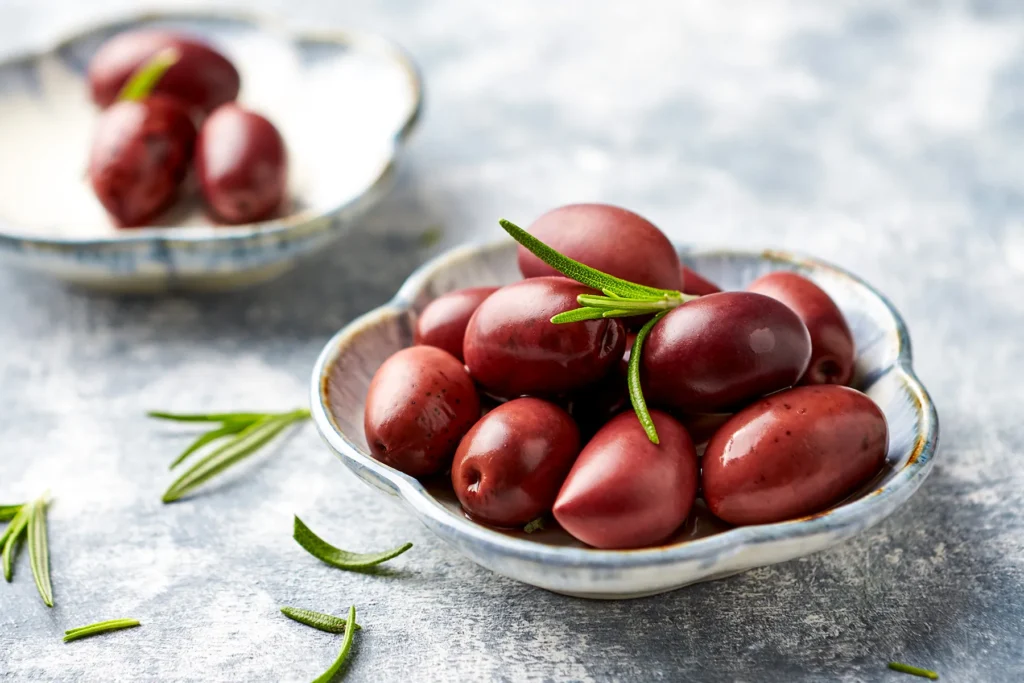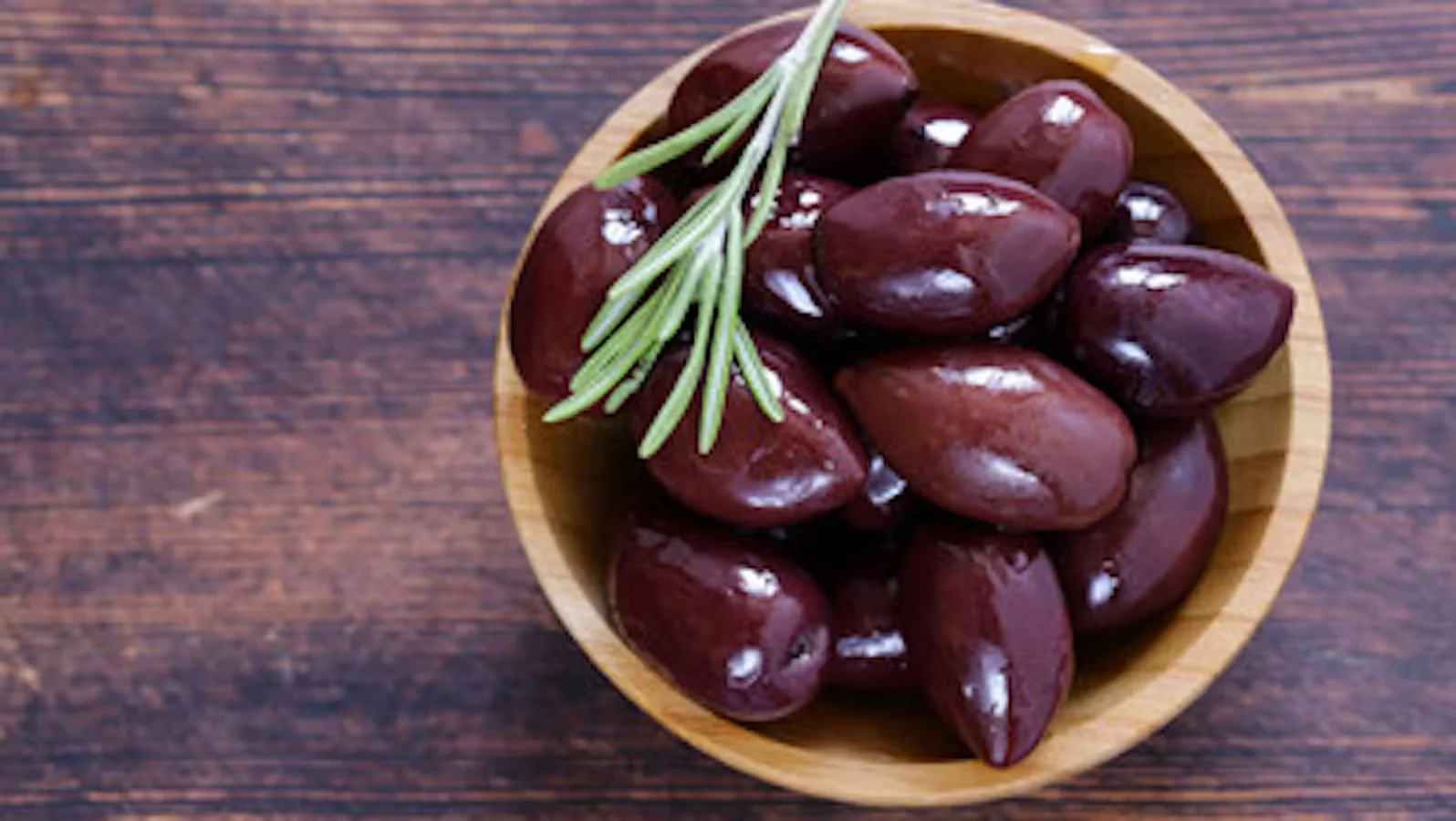Kalamata olives are one of the most powerful superfoods in the Mediterranean diet—and for good reason. These dark-purple, almond-shaped olives are packed with antioxidants, healthy fats, vitamins, and minerals that support heart health, digestion, weight management, and overall wellness. If you’ve ever wondered what is special about Kalamata olives or whether they truly offer superior health benefits compared to regular black olives, this comprehensive guide gives you the complete picture.
In this article, we explore the top 10 amazing benefits of Kalamata olives, their nutrition value, taste, calories, how they compare to black olives, the best ways to include them in your diet, and more. By the end, you will understand exactly why health experts recommend adding them to a healthier lifestyle.
What Are Kalamata Olives?

Table of Contents
Kalamata olives are a premium variety of olives originally grown in the Peloponnese region of Greece, specifically near the city of Kalamata—hence the name. They stand out due to their:
- Deep purple or brownish-purple color
- Almond-like shape
- Smooth, meaty texture
- Naturally rich, fruity flavor
- High antioxidant concentration
They are typically harvested by hand to prevent bruising and cured using a natural brine or vinegar solution. This slow curing method preserves their nutrient profile and enhances their taste.
Kalamata olives are also a trademark component of the Mediterranean diet, one of the healthiest diets in the world.
What Is Special About Kalamata Olives?
Kalamata olives are not ordinary table olives—they have several unique features that make them exceptional:
✔ Rich in Antioxidants
Kalamata olives contain powerful antioxidants such as oleuropein, hydroxytyrosol, and polyphenols. These compounds help reduce inflammation, protect cells from oxidative stress, and support long-term wellness.
✔ Superior Taste and Texture
Compared to regular black olives, Kalamata olives have a richer, fruitier, and more robust flavor. Their soft yet firm texture makes them ideal for salads, sandwiches, pizzas, and Mediterranean dishes.
✔ PDO Status (Protected Designation of Origin)
Authentic Kalamata olives are PDO-certified, meaning they must be grown in a specific region in Greece. This certification ensures quality, authenticity, and traditional farming practices.
✔ High-Quality Healthy Fats
These olives are rich in monounsaturated fats—especially oleic acid—which support heart, brain, and metabolic health.
Are Kalamata Olives Healthy?
Yes—Kalamata olives are extremely healthy. Their nutrient composition makes them one of the best foods for:
- Heart health
- Anti-inflammation
- Digestive function
- Immunity
- Cognitive health
- Weight management
Their antioxidants, vitamins A and E, iron, calcium, potassium, magnesium, and healthy fats make them a smart addition to any balanced diet.
They are also naturally low in carbs, which makes them suitable for low-carb and keto diets.
Kalamata Olives Nutrition Facts
Here is a detailed breakdown of Kalamata olives nutrition per 100 grams:
| Nutrient | Amount |
|---|---|
| Calories | 239 kcal |
| Total Fat | 23 g |
| Monounsaturated Fat | 15 g |
| Carbohydrates | 6 g |
| Protein | 2 g |
| Fiber | 5 g |
| Sodium | 813 mg |
| Iron | 3.3 mg |
| Calcium | 65 mg |
| Vitamin A | 400 IU |
| Vitamin E | 3.8 mg |
Calories in Kalamata Olives
Kalamata olives calories range from 30 to 45 calories per 5 olives, depending on curing method. Most calories come from healthy monounsaturated fats.
Vitamins & Minerals
They are a notable source of:
- Vitamin A (eye and immune health)
- Vitamin E (skin protection and anti-aging)
- Iron (blood health)
- Calcium (bone strength)
- Potassium (heart function)
Top 10 Health Benefits of Kalamata Olives
Below are the 10 amazing Kalamata olives benefits you should know for a healthier lifestyle:
1. Boost Heart Health
Kalamata olives are rich in heart-healthy monounsaturated fats that help lower LDL (bad) cholesterol and raise HDL (good) cholesterol. Their antioxidant oleuropein also reduces inflammation in blood vessels and promotes optimal circulation.
2. Improve Digestion
The fiber in Kalamata olives helps maintain proper digestion, prevents constipation, and supports a healthy gut microbiome.
3. Support Brain Function
Monounsaturated fats and vitamin E help protect brain cells from oxidative stress. Regular consumption may support memory, focus, and long-term cognitive health.
4. Reduce Inflammation
Polyphenols, oleuropein, and hydroxytyrosol act as natural anti-inflammatory agents that help reduce swelling, protect tissues, and lower chronic inflammation risk.
5. Improve Skin Health
Vitamin E and antioxidants help:
- Repair skin cells
- Reduce wrinkles
- Protect from UV damage
- Maintain skin elasticity
This makes Kalamata olives beneficial for naturally glowing, healthier-looking skin.
6. Strengthen Bones
With calcium, magnesium, and polyphenols, Kalamata olives help strengthen bones and may reduce the risk of osteoporosis, especially in older adults.
7. Support Weight Management
Although higher in calories than some foods, Kalamata olives promote satiety, curb cravings, and support metabolic health—making them an excellent snack for weight management.
8. Promote Healthy Cholesterol Levels
Oleic acid helps regulate cholesterol and supports healthy blood pressure levels.
9. Provide Antioxidant Protection
The high antioxidant content protects cells from damage, reduces risk of chronic diseases, and promotes overall health.
10. Enhance Immune System
With vitamin A, vitamin E, iron, and polyphenols, Kalamata olives provide immune support and increase your body’s ability to fight infections.
What Do Kalamata Olives Taste Like?
Kalamata olives have a rich, fruity, tangy, and slightly smoky flavor. They tend to be softer and more flavorful than regular black olives, with a natural wine-like aroma.
Food enthusiasts often describe the taste as:
- Fruity
- Smooth
- Bold
- Slightly salty
- Mildly tangy
Their distinctive taste makes them perfect for salads, pizzas, pastas, and Mediterranean dishes.
Kalamata Olives vs Black Olives: Which Is Healthier?
Here is a clear comparison to help you choose:
| Feature | Kalamata Olives | Black Olives |
|---|---|---|
| Color | Purple | Black |
| Flavor | Rich, fruity | Mild |
| Nutrition | Higher in antioxidants | Lower |
| Fat Type | Mostly monounsaturated | Mixed |
| Curing | Natural brine | Often lye-cured |
| Health Benefits | Higher anti-inflammatory properties | Good, but less potent |
Which is healthier?
Kalamata olives are healthier due to their:
- Higher antioxidant content
- Better fat composition
- Traditional curing process
- Richer nutrient profile
Best Ways to Add Kalamata Olives to Your Diet
Here are some delicious and healthy ways to enjoy Kalamata olives:
1. Add to Salads
Use them in:
- Greek salads
- Mediterranean bowls
- Pasta salads
2. Use Kalamata Olives on Pizza
They add a flavorful, salty punch to:
- Veggie pizzas
- Margherita pizzas
- Chicken Mediterranean pizzas
3. Add to Pasta and Rice Bowls
Pair them with feta cheese, cherry tomatoes, olive oil, and herbs.
4. Enjoy as a Healthy Snack
A handful of Kalamata olives makes a nutritious, satisfying snack.
Best Kalamata Olives (How to Choose the Right Ones)
When looking for the best Kalamata olives, consider:
✔ Check for “PDO” Label
Ensures authentic Greek quality.
✔ Choose Brine-Cured Over Lye-Cured
Brine-cured olives retain more flavor and nutrients.
✔ Kalamata Olives Price Range
Typically $6–$15 per jar, depending on brand and curing method.
✔ Oil-Packed vs Brine-Packed
- Oil-packed: richer flavor
- Brine-packed: healthier, lower fat
Side Effects and Precautions
Kalamata olives are safe for most people but consider the following:
High Sodium Content
People with high blood pressure or sodium sensitivity should consume them in moderation.
Allergies
Rare, but some individuals may be sensitive to olives.
Portion Control
Because they are calorie-dense, avoid overeating.
FAQ – People Also Ask
Are Kalamata olives good for weight loss?
Yes, their healthy fats and fiber promote fullness and reduce cravings.
Are Kalamata olives healthier than black olives?
Yes, they contain more antioxidants, healthier fats, and richer nutrients.
Can you eat Kalamata olives every day?
Yes, in moderation—around 5–10 olives per day.
Do Kalamata olives have probiotics?
Fermented Kalamata olives may contain natural probiotics that support gut health.
How many Kalamata olives should I eat per day?
5–8 olives per day is ideal for most adults.
Are Kalamata olives good for the heart?
Yes, thanks to monounsaturated fats and polyphenols.
Are Kalamata olives keto-friendly?
Absolutely—they are low in carbs and high in healthy fats.
Why are Kalamata olives expensive?
Because they are handpicked, naturally cured, and PDO-certified.
What is the correct Kalamata olives pronunciation?
It is pronounced: “kah-lah-MAH-tah”.
For more high-protein, meat-focused meal ideas, you can explore a wide variety of carnivore recipes at My First Recipe. These recipes are perfect for anyone following a low-carb or animal-based diet and looking to add wholesome, satisfying dishes to their menu.
Conclusion
Kalamata olives are more than a delicious Mediterranean ingredient—they are a nutrient-packed superfood that supports a healthier lifestyle. Whether you want to boost heart health, reduce inflammation, manage your weight, or enjoy a richer, more flavorful diet, Kalamata olives are one of the best foods you can add to your daily meals.
If you care about long-term wellness, holistic nutrition, and healthier diet choices, you may also explore expert-based health insights such as this guide:
How Is Gloria Copeland’s Health?




